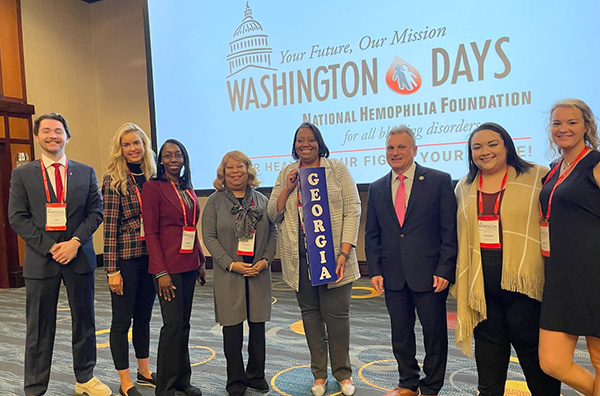
NHF Washington Days 2023
Clients, staff, and family members from Hemophilia of Georgia joined advocates from all over the country (back in person) in Washington, D.C., for NHF’s 2023 Washington Days from March 8-10. Deniece Chevannes, HoG’s Vice President of Public Policy, Health Equity & Research; Alesha Wright, Director of Health Education; Jordan Brewer, Social Worker; and Michelle Conde, Senior Director of Advocacy, were joined by Jennifer Pharaoh, HoG’s Washington lobbyist; Savannah White and Kate Reese from HoG’s Junior Board; and long-time HoG volunteers and advocates Luke Blackmon, Alma Jewell, and Mike Jewell.
In addition to pressing for continued funding for the federal agencies that support bleeding disorder care, the advocates asked members of Congress and their staff to take action against Copay Accumulator Adjustment Programs by supporting HR 830, the Help Ensure Lower Patient Copays Act (HELP Copays Act). The HELP Copays Act was introduced by Georgia’s own Representative Buddy Carter and is a two-part solution that eliminates barriers to treatment for some of the most at-risk patients. This legislation would allow additional payments, discounts, and other financial assistance to apply to the cost-sharing requirements of health insurance plans. The annual treatment costs can exceed $350,000 per year for a person with severe hemophilia. Therefore, people with bleeding disorders hit their health insurance’s annual out-of-pocket (OOP) maximum each year, often in January. Many families need financial assistance to pay these OOP costs and receive it from nonprofit organizations or pharmaceutical companies.
An increasing number of private health insurance plans are implementing copay accumulator programs that don’t allow co-pay assistance to count towards a patient’s OOP maximum. When co-pay assistance is not allowed, many patients cannot afford their treatments and stop taking them or reduce the prescribed dosage. This often leads to complications and has unintended consequences (i.e., increased visits to the emergency room, joint bleeds/damage, and missed days from work/school) that harm patients and increase overall costs. The bleeding disorder community believes that plans should be required to count all co-pays (regardless of who pays) towards a person’s OOP maximum.
If your family has been affected by a copay accumulator program, please let us know at Hemophilia of Georgia by contacting our Senior Director of Advocacy, Michelle Conde, at maconde@hog.org. Members of Congress need to hear personal stories from people living in their district to help persuade them to take action.
